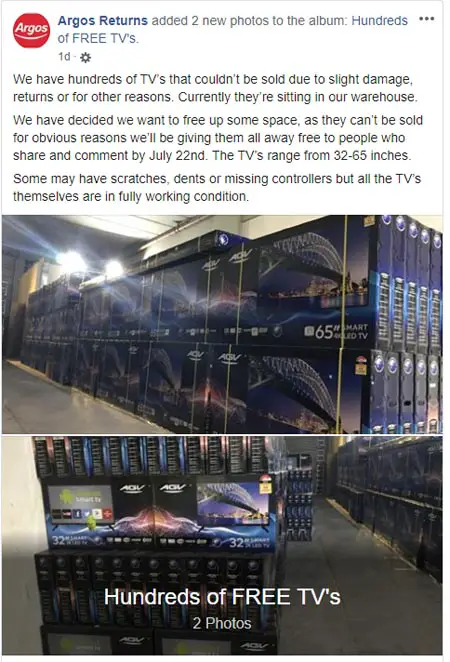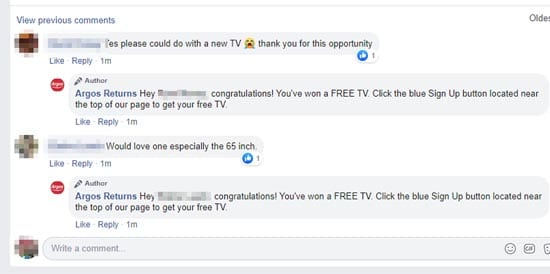If you’ve seen a Facebook page that seems to belong to a well-known brand offering freebies like “RVs” or “slightly damaged TVs” to anyone who comments and shares a Facebook post, you’ve probably seen the first stage of a data harvesting scam.
Data harvesting scams that use the “we’re giving away free stuff to anyone who shares our post” or “win this really expensive prize just by sharing our post” façades are pretty much par for the course on the social networking platform, and we’ve warned of countless variants over the years. Short version of that warning; no, there are no freebies or competitions. It’s a trick to lure you into giving away your contact data to anyone with a spam mailing list.
But how many hoops do you really need to jump through and how much information do you really need to give away with these scams?
We look a look.
We assumed the role of Jim Carrey’s Yes Man to see how many things we’d have to agree to in order to get that free product. And that free product, in this case, was a “possibly slightly damaged” flatscreen TV that – according to Argos Returns (spoiler: it’s not really Argos) – may or may not come with the controller.


This fake Facebook page (that lacks the verified blue tick and was only created 4 days prior according to Facebook’s Page Transparency tool) was taking the unusually overzealous step of individually telling every single person that commented to claim their free TV by clicking the blue Sign Up button.


That takes the person to stage two of the scam. The data harvest. If you thought you could just click the link and claim your TV (as the Facebook page implies) then you’re in for a disappointment. As we’re about to discover, you’re not even close to claiming your non-existent prize.
First, surveys. We had to answer several questions about ourselves such as our address, shopping habits, online habits and – of course – our name and email.
All in all, there were around 25 questions, and while they seemed to take on the appearance of “qualifying questions”, how you answer them is ultimately irrelevant, since you always get through to the next stage.
Secondly, deals. To “qualify” for the TV that Argos are just giving away (which, remember, isn’t real) we had to complete a Silver Deal (above). Then the TV, presumably, would be ours. Deals generally mean having to sign up to something, such as a trial – after which you pay a monthly subscription.
We clicked on one of the deals – which directed us to their website – then signed up for an account, and then clicked continue finally to claim our prize.
But no. Next, we had to complete two more deals. “Gold deals”. Again, this means visiting and signing up to third party websites, giving them our information and starting a free trial with them.
Still though, two more deals completed, and the TV is sorted.
Not even nearly. Because now we have to complete 8 DEALS! This means going to 8 different companies, signing up for various accounts and trials and giving our personal information to them (many of which we wouldn’t trust with just our name, let alone our postal address)
We wonder why these websites don’t explain upfront how many hoops you have to jump so you could make an informed decision?
Signing up for these 8 deals took some time. Of course, none of the information we were giving was real.
Sponsored Content. Continued below...
And after that, we eventually completed all the deals, at which point we were told to check our “qualifying status” by entering our email address once more, only to be told many of the deals “hadn’t completed” (whatever that means) and that we needed to go back and complete another indefinite amount of deals.
At this point, with no end in sight, we just had to stop.
This is what people who enter these fake Facebook competitions of giveaways have to contend with, all without knowing at the time that [in this case] Argos are not giving away TVs. It’s all a scam, but by the time someone comes to this realisation, they have active accounts and trials open with dozens of companies, and their contact information has been handed over to marketing companies where it will be sold on, meaning one thing; spam. And lots of it.
And with your contact information out there being booted from one company to the next, this increases the risk of targeting phishing scams and identity theft as well.
All for a slightly damaged TV that never existed.
These scams are NOT WORTH IT. Don’t enter them “just in case” and don’t share them with your friends on Facebook, because that puts them at risk as well.
Thanks for reading, we hope this article helped, but before you leave us for greener pastures, please help us out.
We're hoping to be totally ad-free by 2025 - after all, no one likes online adverts, and all they do is get in the way and slow everything down. But of course we still have fees and costs to pay, so please, please consider becoming a Facebook supporter! It costs only 0.99p (~$1.30) a month (you can stop at any time) and ensures we can still keep posting Cybersecurity themed content to help keep our communities safe and scam-free. You can subscribe here
Remember, we're active on social media - so follow us on Facebook, Bluesky, Instagram and X